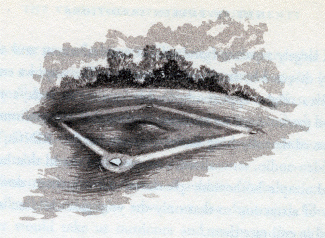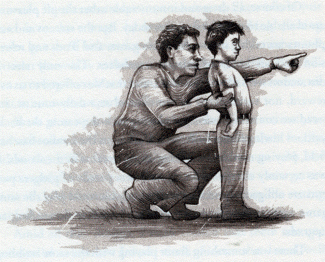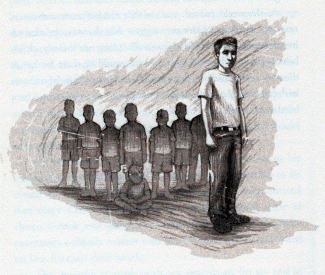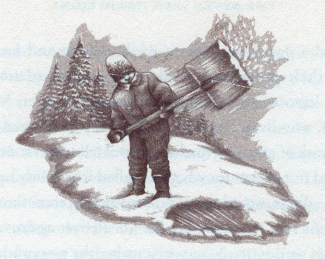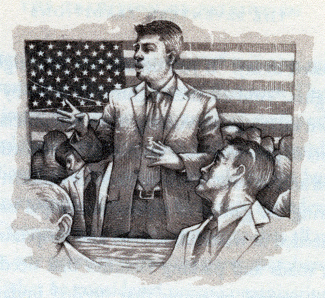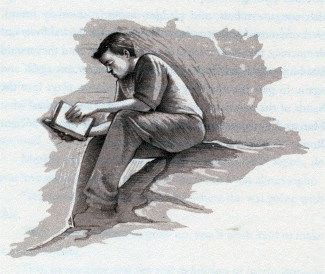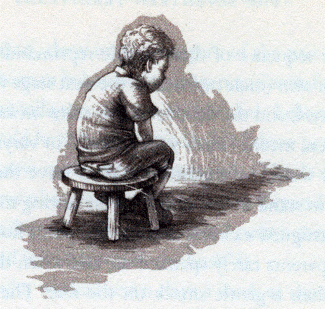
My siblings and I were raised to have respect for our mother and father -- a respect born of our generations of family tradition, but also earned on a daily basis by their example. Yet of course we got into mischief, as all children do. And when we did, there were consequences.
Mother and Father followed a finely calibrated series of parental reprimands, a system that we learned early and became accustomed to heeding. It started with a sudden stern look -- and often that was enough to change our young minds before things went any further. When the look alone didn't work, they relied on a sequence of three Arabic reprimands. The mildest was skoot or skiti (male or female), the next stage was sidd neeyak or siddi neeyik, and the third level was sakru neekoon. Translated loosely, these meant "hush your mouth" in varying degrees. If that didn't work, we might be told to leave the dinner table and/or go to stand in the corner by the sewing machine. Or we might be assigned a chore, to drive the point home in another way. Our parents rarely spanked us, and when they did, it was no more than a gentle smack on the rear. Then as now, too many children have been picked up and shaken -- as toddlers, even infants -- or beaten by parents losing their self-control and abandoning themselves to rage. My parents were horrified by such behavior.
But they knew the importance of enforcing their commands around the house. As my mother was known to say, "If parents don't discipline, or they're indecisive about it, their children won't respect them." It wasn't enough to issue a reprimand, in other words -- not if the parent merely unravels it a few minutes later by apologizing (even tacitly) and fawning all over the child. Any child who's treated that way is being trained in the ways of manipulative behavior. "Children are clever," Mother said, "they watch their parents and can take advantage where they see weakness."
Instead, my parents chose to show us where we had gone wrong, and they often did so by relying on traditional proverbs. The supply of proverbs at their disposal was countless, and they wielded them effortlessly. These sayings, which came from a rich oral tradition, drew on the imagery of the past to reframe all manner of human behavior for the generations of the present and future. The villagers and peasants of their Lebanese mountain towns would have known hundreds of these proverbs; our Aunt Adma knew more than a thousand. (Think a moment: How many proverbs can you call to mind, beyond Benjamin Franklin's homilies -- ''A penny saved is a penny earned" or ''A bird in the hand is worth two in the bush"?)
My dad, who worked seven days a week at the restaurant, used proverbs constantly. To a child talking silly, he would say (in Arabic), "Jokes are to words as salt is to food" -- that is, don't overdo it. To a child who'd put off his chores too long, the apt and famous proverb was, "Wait, oh mule, until the grass grows up." When generosity was called for, he would say, "Empty hands are dirty hands." Such proverbs were admonishments, to be sure. But they also managed to teach and uplift our horizons at the same time -- far more than the staccato barking of parents who shout, "Stop it! I said stop it!" or "Cut it out, now, or you'll be sorry," and then have to repeat themselves over and over while the child ignores them. Dad was a devotee of the Socratic method; he loved nothing more than to pose a provocative question and then let it hang in the air. Once, when he noticed a bunch of teenagers in his restaurant laughingly pouring pepper in the sugar bowl, he came over to them and quietly asked, "Why are you insulting your parents?" as he took away the sugar bowl. Instead of asking them to leave, he merely walked away, leaving them to ponder over his words.
Both my father and my mother were highly sensitive to the weakening of parent-child relationship in modern society -- to the threat the marketplace posed to the concept of parental authority. Even back in the 1930s and 1940s, my mother noticed that some caring parents were afraid of their children, afraid of how they might react if they were disciplined. She noticed even more fear as she grew older, and often commented that ''Americans are afraid of their children." She believed that children who see that their parents are afraid of them will try to control their parents, who will then begin to lose their parental moorings as a result. We were always astonished to heat a classmate slinging harsh words at his parents. To be sure, we weren't always privy to what provoked such outbursts; we just knew that in our family there were lines you never crossed. (Only later did we realize that such behavior could be symptomatic of child abuse behind closed doors -- though the parents we observed never treated their children brutally, at least in public.)
When we ran afoul of our own parents, did we get a chance to argue our case? Not in trivial, run-of-the-mill situations, but when there was a meaningful disagreement at stake, yes. "When my children would explain [themselves] to me," my mother once said, "I would sometimes find that they were tight, but I also explained my position." Mother believed that a child should understand why he's being told no, or yes. She always valued a good argument on a worthwhile subject. But she also believed that a child shouldn't be allowed to argue for argument's sake.
As we grew into our teenage years, our parents were more willing to engage us in back-and-forth dialogues on our little domestic controversies. But they also had subtle ways of reminding us how much they labored for our well-being, and how many years of knowledge had gone into their positions. We often, if not always, gave them the benefit of the doubt. We respected their authority, never calling them by their first names no matter what our age. But we never became overly dependent on them, either. Their unassuming confidence only enhanced our own self-confidence -- until we began to seem overconfident, in which case they were quick to reply, "So, since you've got all the answers, you don't have any more questions, eh?"
There was one respect in which Mother and Father showed absolutely critical self-discipline, and that was in their interactions with each other. As children, we were aware of occasional friction between our parents. We could sense the mood changing when that occurred. But the conflict never spilled out in our presence, for our parents believed that any such display would have reduced our respect for them. They were able to keep their differences very private from us and from their friends, in part because the differences between them were mostly ordinary tensions that worked themselves out in the course of daily life. For them, the well-being of their children, which took priority over petty disagreements, served as a kind of universal solvent, dissipating any lingering tensions.
This mutual self-respect came home to us whenever we were at our friends' homes and witnessed sharp exchanges and vitriol between their parents. Sometimes, just walking the residential streets, we would hear shouting from one home or another. Once, as I was walking downtown to do an errand for my mother, I saw a door fly open, and a husband rushed out shouting curses, with his wife right behind him throwing miscellaneous pots and utensils at him along with a stream of invective. There was nothing like that kind of spectacle to help a boy appreciate his parents' efforts to preserve their emotional self-control.
As my mother often said: "If you make something bigger, it becomes bigger; if you make it smaller, it becomes smaller."

